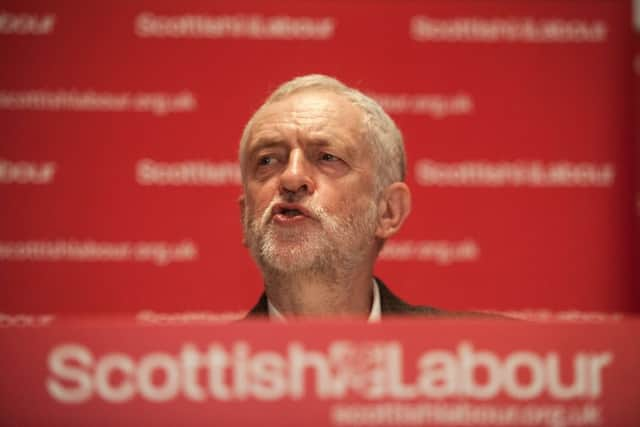What does Labour's poll revival mean for Scotland?


After being understandably postponed in the wake of the terrorist attack in Manchester, campaigning for the General Election on June 8 has restarted in earnest today.
With less than a fortnight now until voters go to the polls, parties are stepping up their policy announcements, and sniping at their rivals.
Advertisement
Hide AdAdvertisement
Hide AdAnd with a backlog of polls being released yesterday, the story of the newly resumed campaign seems to be an extraordinary turnaround in fortunes for Jeremy Corbyn and the Labour party.
A Yougov poll for the Times saw the Tories drop to 43 per cent, with a Labour surge seeing them move up to 38 per cent, within five of the Conservatives.
Many attribute that reversal in fortunes for Theresa May a result of her botched roll-out of a new policy on how older people’s care is paid for.
It is worth noting that prevailing wisdom from pollsters, pundits and bookmakers is that Jeremy Corbyn won’t win and the Tories should enjoy a handsome majority once the votes are counted.
Nevertheless, the improvement in Labour’s poll standings is significant, and here in Scotland, we analyse how it could affect the main parties.
Labour
It seems almost churlish to consider this poll anything other than good news for Labour in Scotland – they are closing in on the Tories in an election that they were meant to lose handily.
Indeed, some Labour candidates can be considered key Corbyn allies north of the border, such as Rhea Wolfson in Livingston.
But many more of Kezia Dugdale’s candidates are running a campaign that neglects to mention the leader at all.
Advertisement
Hide AdAdvertisement
Hide AdThis is especially in true in areas that have high Conservative support, such as in East Renfrewshire, former seat of ex-leader Jim Murphy.
There, the man who led the Better Together campaign, Blair McDougall, is the Labour candidate, is making far more of his unionist credentials than of his leader.
Ian Murray, in Edinburgh South, is hopefully that his constituency’s Tory voters will back him as the candidate most likely to stop the pro-independence SNP.
He too, is relying on a reputation as being opposed to Corbyn, having resigned from the shadow cabinet over the latter’s leadership.
Candidates like that are, counter-intuitively, helped by low Labour poll ratings in the rest of the UK because voters deterred by Corbyn can vote for a Labour candidate they like safe in the knowledge that a Labour Government is a distant prospect.
Any Corbyn surge makes that Government more likely, and could imperil Labour candidates relying more on local issues helping them to victory.
Conservative
This poll is of course bad news for Conservatives everywhere, but it could be especially bad for the Tories in Scotland.
Ruth Davidson’s party has talked little and less about UK-wide issues, preparing instead to try for a repeat of their local elections success with an unrelenting focus on matters constitutional.
Advertisement
Hide AdAdvertisement
Hide AdApart from a Tweet aimed at Jeremy Corbyn’s previous stances on the Troubles in Northern Ireland, Ms Davidson has mentioned Labour and their leader precious few times on the campaign trail.
Billing themselves as the party to block indyref2 and defeat the SNP has proved successful for the Conservatives, now firmly established as the second force in Scottish politics.
But when forced to account for or defend the policies her party advocates at a UK-level, Ms Davidson’s normally accomplished media performances can come rather unstuck.
She was on the backfoot over the so-called rape clause in a combative interview with Radio 5 Live, and has, on a number of occasions, offered conflicting views of her ideal for Scotland as a welcoming home for immigrants.
If the General Election suddenly becomes a close run thing, Ms Davidson could be forced to discuss her party’s policies more and more, and that way lies danger.
The SNP
Many would contend that the SNP are only concerned with polling in Scotland, but that doesn’t quite tell the whole story.
The SNP have been able to bill themselves as standing up for Scotland as Theresa May pushes for a hard Brexit.
A strong SNP contingent at Westminster, Nicola Sturgeon contends, could be a bulwark against those Tory plans.
Advertisement
Hide AdAdvertisement
Hide AdThat message implies, and has indeed been stated by the First Minister on many occasions, that the Labour party have virtually no chance of winning the election.
Should the prospect become more likely, voters may conclude that the best bulwark against Theresa May is a Labour Government.
Conservatives too, who could have split the vote by backing a unionist Labour candidate, could mobilise around their own prospective MPs, damaging the SNP in constituencies where the Tories could come from third position.
All three parties will doubtless keep an eye on any further polling fluctuations as election day on June 8 looms large.
